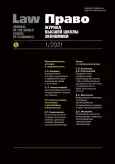Consumer Credit Regulation in EAEU States
- Authors: Baishev R.1
-
Affiliations:
- Almaty Municipal Court
- Issue: Vol 14, No 1 (2021)
- Pages: 218-243
- Section: Law in the Modern World
- URL: https://journals.rcsi.science/2072-8166/article/view/318101
- DOI: https://doi.org/10.17323/2072-8166.2021.1.218.243
- ID: 318101
Cite item
Full Text
Abstract
About the authors
Ruslan Baishev
Almaty Municipal Court
Email: aselbai82@mail.ru
Judge, Magister in Law
References
- Brovkin A.V., Bychkova N.P. (2005) Legal nature and essence of credit. Krasnodar: Institute of Economics and Management, pp. 92-97 (in Russian)
- Bychkova N.P. (2006) Conditions of credit agreement as a security. Candidate of Juridical Sciences Thesis. Moscow, 208 p. (in Russian)
- Demchenko S.S. (2012) Modern regulation of consumer credit in Russia. Advokat, no 4, pp. 32-43 (in Russian)
- Demchenko S.S. (2012) Subjects of consumer credit agreement: legal status. Pravo i ekonomika, no 5, pp. 31-38 (in Russian)
- Kafyrin E.A. (2019) Philosophical and scholar knowledge. Pravosudie, no 1, pp. 124-138 (in Russian)
- Khvatik Yu. A. (2010) Issues of the participants of credit relations. Belarus in modern geopolitical conditions: political, legal and socioeconomic aspects of of development. Papers of a conference. Minsk: MVD, pp. 91-96 (in Russian)
- Kirpichev A.E. (2015) Gratuity of contract in civil law. Rossiyskoe pravosudie, no 10, pp. 22-29 (in Russian)
- Kondrat'ev V.A. (2016) Making of contract. Rossiyskoe pravosudie, no 1, pp. 18-25 (in Russian)
- Kulakov V.V. (2011) Complex obligations in civil law. Doctor of Juridical Sciences Thesis. Moscow, 382 p. (in Russian)
- Kulakov V.V. (2015) Unfair contractual conditions in judicial practice. Rossiyskoe pravosudie, no 5, pp. 56-62 (in Russian)
- Matskevich I.M. et al. (2010) Broadening list of securities in civil law. In: Traditions and innovations in modern Russian law. Moscow: MGYuA, pp. 251-253 (in Russian)
- Shcheglov A.F. (2017) Economics: a manual. Moscow: RGUP, 184 p. (in Russian)
- Solomin S.K. (2010) Theory of civil law regulation of bank credit relations. Doctor of Juridical Sciences Thesis. Moscow, 339 p. (in Russian)
- Sukhanov E.A. (1997) The legal nature of interest in financial obligations. Zakonodatel'stvo, no 1, pp. 8-12 (in Russian)
- Tarikanov D.V. (2005) The responsibility for breaching financial obligations. Zakonodatel'stvo, no 2, pp. 7-17 (in Russian)
Supplementary files








